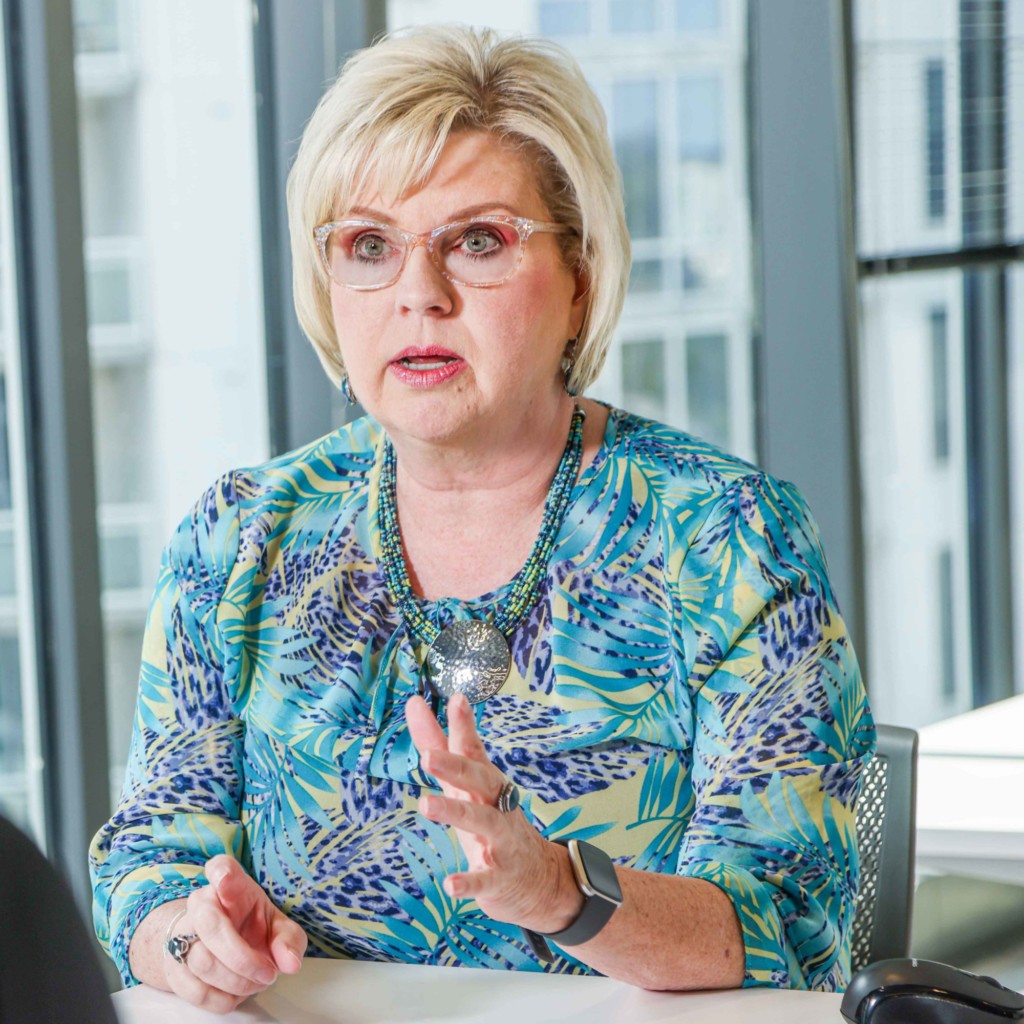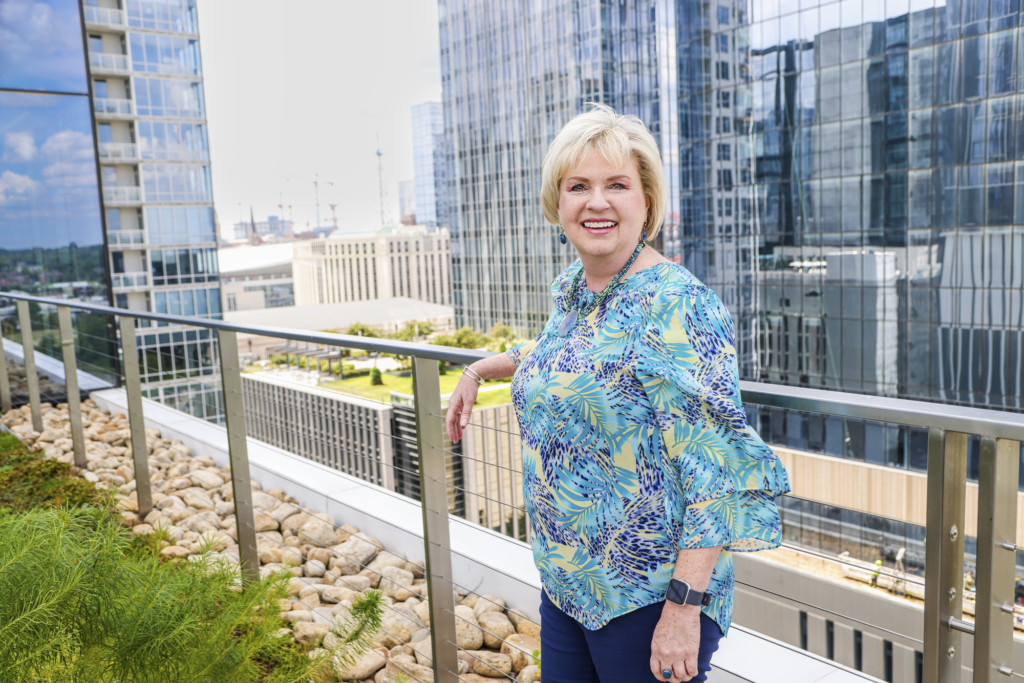“Well, I was born a coal miner’s daughter…” begins Loretta Lynn’s signature song in which she reflects on the hardships of growing up in rural Kentucky. She may not have been born in Butcher Holler, but Charlotte Disney, a senior administrative assistant in Gresham Smith’s Industrial market and a member of the firm’s Women’s Employee Resource Network, was also a coal miner’s daughter, born in the Eastern Kentucky Coal Field region.
It seemed that coal was destined to be a common theme in her early years when she secured her first-ever administrative job at a strip-mining site for coal in Southern Kentucky. From her desk, she had a birds-eye view of the daily blasting and surface mining that took place in order to reach the underlying coal seam.
Since blasting onto the administrative scene in 1974, you could safely say that Charlotte Disney has pretty much seen it all after almost five consecutive decades as an administrative professional. To celebrate Women’s Equality Day, we sat down with Charlotte to discuss her decades-long career. As one would imagine, after almost 50 years in her field, she has a lot to say—especially to women. And she’s telling it like it is.
You had a unique beginning to your career working on-site at a coal strip-mining company. Tell us a little bit about your early years.
Charlotte Disney: Back in 1974, I was making $2.75 an hour as a secretary/bookkeeper at the coal company, which was about the standard hourly pay for that time in that region. From there, I went to work as an administrative assistant at a new dairy factory—my first job in the Industrial market—in my hometown of London, Kentucky, that also had its offices on-site. I was working in very “basic” conditions to start with, and at one time we had no heat or AC. I remember clustering around a portable space heater with my co-workers during the winter just to get warm! Things have improved for me drastically since those early days.
“You’re only a secretary so you don’t know what you’re talking about—just stick to what you know.”
What was the overall landscape like for women in the workplace at the time you started your career?
Charlotte: Gender inequality in the workplace was a real issue when I began my career, and I found myself on the other end of some pretty demeaning comments from some of my male bosses. For example, I was taking meeting notes one day and weighed in on a discussion item that I was knowledgeable about. My supervisor’s response was: “You’re only a secretary so you don’t know what you’re talking about—just stick to what you know.”
At another company earlier in my career, one of my supervisors told me that he didn’t want any females on his roadcrews. When I asked him why, he said it was because they distracted the men from doing their jobs.
I have also been the victim of verbal and emotional abuse, as well as sexual harassment in the workplace. There were times when I felt like a prisoner of war at the office—times when I’d start shaking whenever the perpetrator walked into the room. Times when I’d walk in the other direction if I saw him coming down the hall. Nobody, female or male, should ever have to go through what I encountered just to earn a paycheck. And I think it’s important to note that I’ve worked for a couple of female supervisors during my career who were verbally and emotionally abusive as well.
These past experiences just make me all the more grateful to work with someone like Michelle Wright, who is the market vice president of our Industrial group. She has only ever made me feel valued and respected. It’s been a night-and-day experience when I think back to those truly low points in my career.

What advice do you have for women who find themselves the victim of abuse in the workplace?
Charlotte: Don’t keep it in. Talk to somebody about it. Go to your Human Resources department if you have one. There were times when I confronted the person directly because there was no such department as Human Resources back then. And I always ended up frustrated because nothing was ever resolved. If you truly feel you want to confront that person, then always have an advocate present so whatever you say cannot be misconstrued.
Today, there are more resources in place at companies than ever, and I can’t overemphasize how important it is to reach out to those resources if you’re the victim of abuse in the workplace. If the company you work for doesn’t have that type of support system available to you, then I’d say it’s probably time to look for another firm because you cannot continue to live like that. It ends up infiltrating every part of your life, including your personal life, because you take it home with you.
Of course, abuse comes in many forms. In a previous job, I was expected to do the work of four people when the company went through a series of layoffs, including several administrative assistants. And I found myself wearing four very different hats—from serving as an executive assistant to three different markets to working the front desk as their receptionist.
I am all for being a team player and taking on additional responsibilities when times are tough. But I was expected to do the jobs of multiple people when the only raise I had in seven years was a nickel. It was an extremely devaluing experience at that juncture of my career to say the least. I’m so thankful that I have grown to be confident in who I am, and I will never take that kind of abuse—or any kind of abuse—again.
“There were times when I felt like a prisoner of war at the office …”
Have your experiences with inequality been limited to just the workplace?
Charlotte: No. I actually ended up leaving my previous church because of its stance on women. Women could not be in the pulpit for any reason. They thought that was exclusively a man’s domain. Women were, however, allowed to teach Sunday School or sing in the choir, or maybe sit on a committee. But you couldn’t hold any of the upper positions. All the deacons were men. All the elders were men.
Now, I’m a member of a wonderful non-denominational church that is extremely diverse and multigenerational, and it doesn’t pigeonhole women into certain positions.

“If women are reluctant to advocate for one another, then we’ll never make strides toward equality in business. I believe this can only happen when we become true allies.”
Why is it important for women to be allies to other women, especially in the workplace?
Charlotte: Because it helps you to know that you’re not alone and that there’s strength and power in numbers. The bottom line is, we need each other’s support. And if we’re not supporting each other, we need to start. If women are reluctant to advocate for one another, then we’ll never make strides toward equality in business. I believe this can only happen when we become true allies.
I also think it’s important for women to mentor younger women coming into a firm. If they’ve experienced something similar to you, it gives you the opportunity to provide guidance because you’ve walked the walk. I always tell younger women to go to someone who has a little more experience and wisdom than they do and see what their take on a problem is. I also think it’s important to look for a company that has a great culture.
When I first interviewed for my position at Gresham Smith, Michelle Wright told me that they didn’t just look for warm bodies to sit in a seat—they were looking for a great fit. The moment she said that I knew this was the place for me.

How does it feel to have transcended previous inequalities in the workplace to be doing what you’re doing today?
Charlotte: It’s truly eye-opening. Before I came to Gresham Smith, I didn’t know that any of these possibilities existed because I felt like I was in a time warp in previous positions. My role at this firm has empowered me to be bolder in terms of my career path. It’s empowered me to not be afraid to ask if I want something, especially as it pertains to my professional growth.
When I look back on the trajectory of my career, I went from typing, filing, answering phones and making coffee—and being told that I’d gone as far I could go in my career because I was a woman—to project management, which is a part of my role as senior administrative assistant. I feel like I’ve finally hit my stride and I’m now in a position where the sky’s the limit on how far I can take my career.
So, to any women out there who have endured inequalities, abuse, or feel like they’ve reached that ubiquitous glass ceiling—never give up on your dream. It’s never too late. Have the audacity and the fire to keep pushing forward. When you do, it’s amazing what tomorrow can bring!